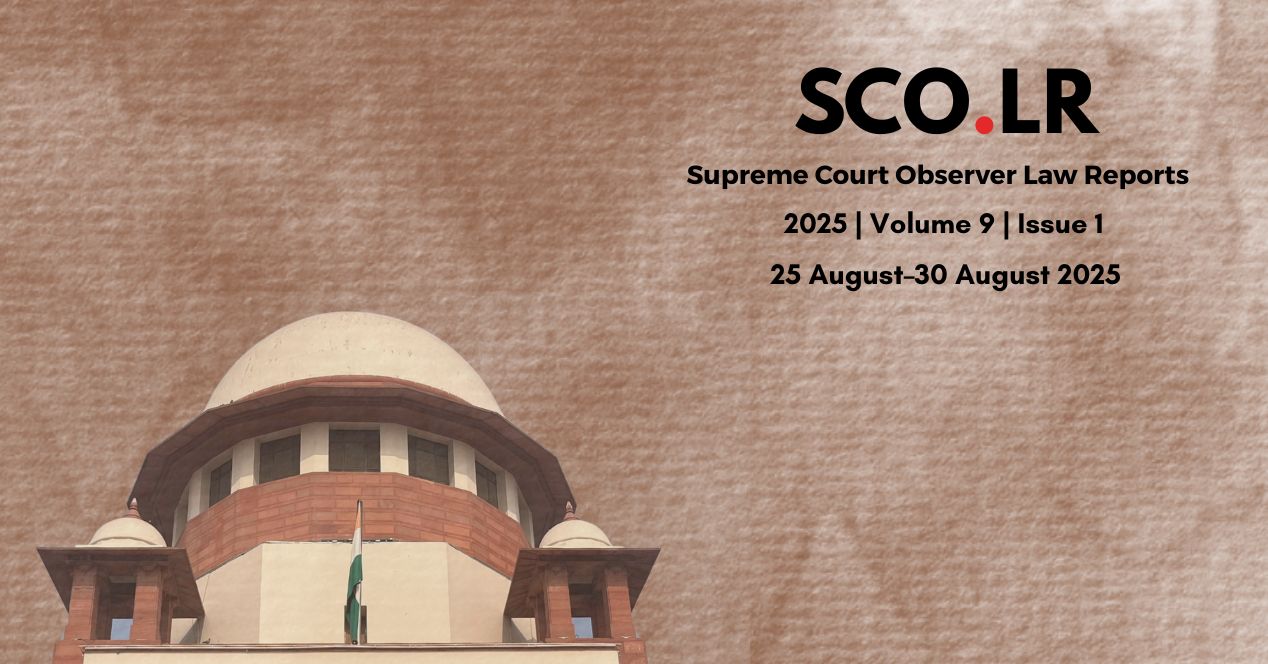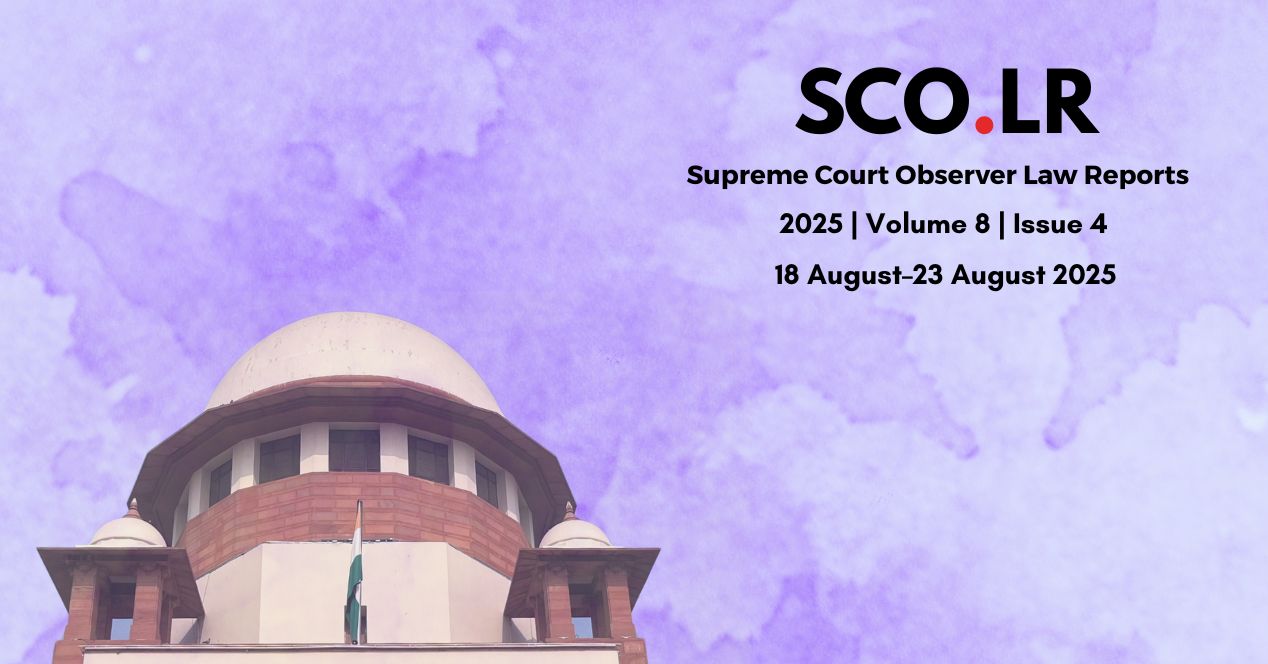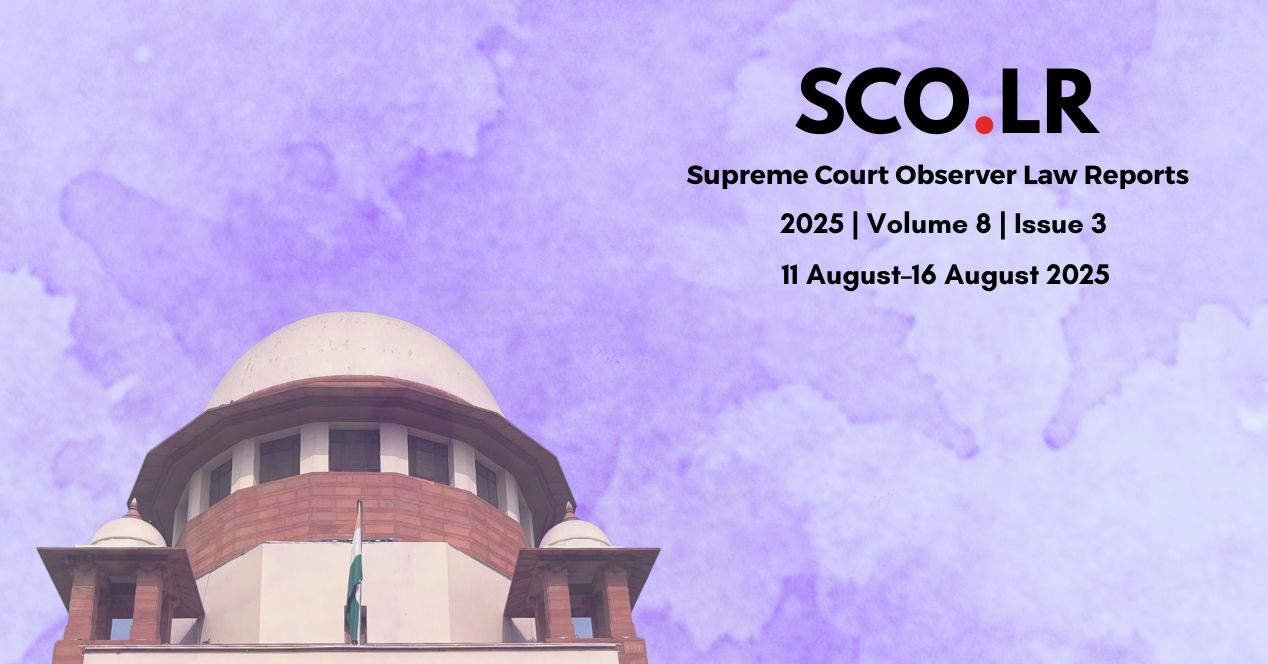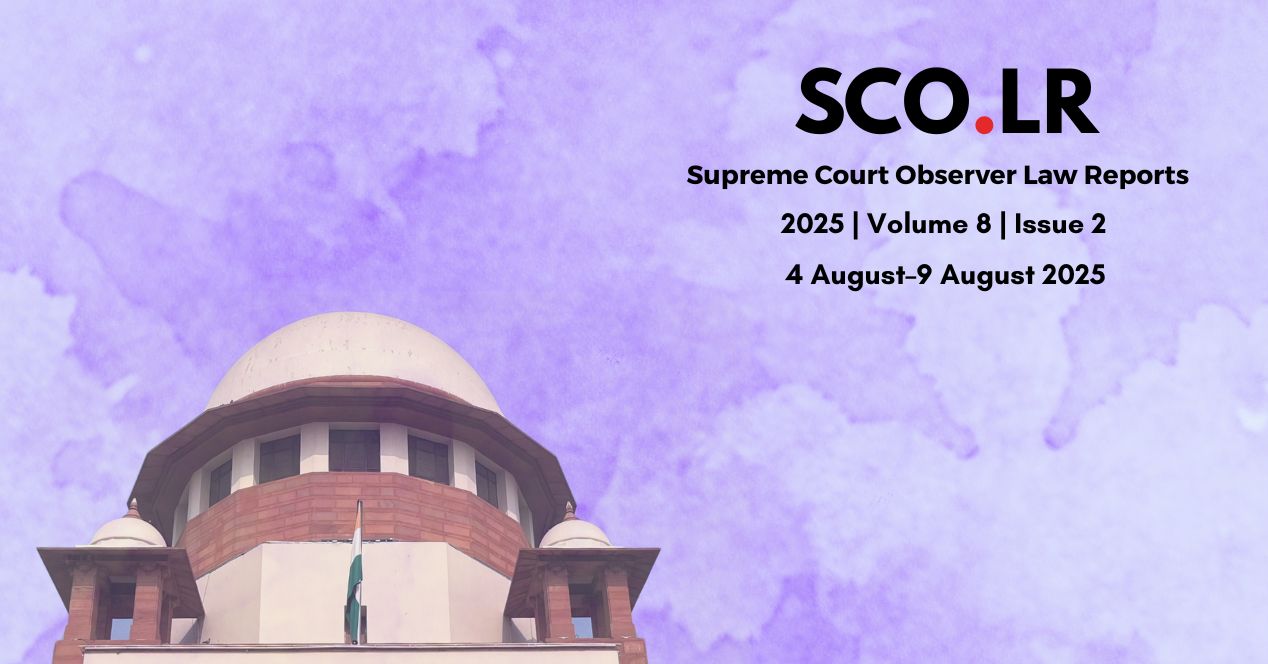Analysis
SCO.LR | 2025 | Volume 9 | Issue 2
In this Issue of SCO.LR, we bring you five important judgements from 1 September to 6 September 2025
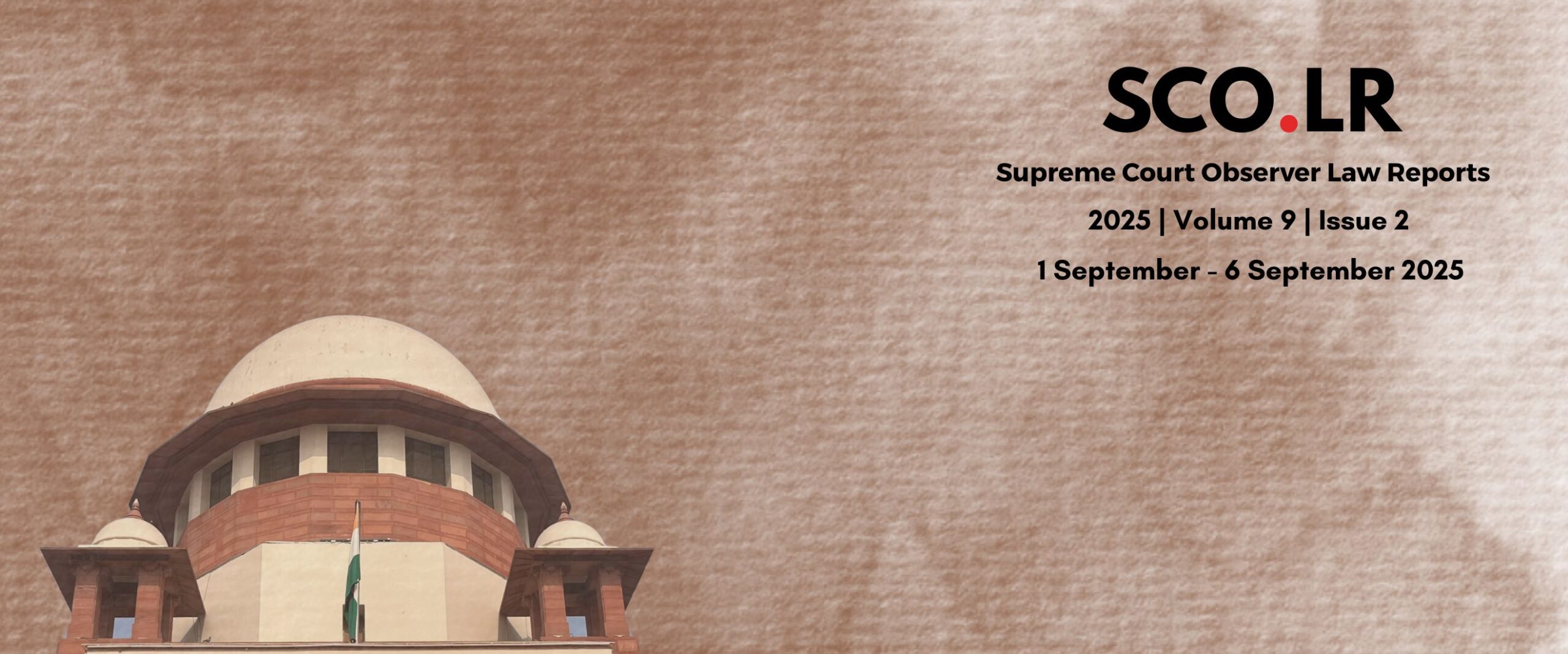
This is Volume 9, Issue 2 of the Supreme Court Observer Law Reports (SCO.LR). In this edition, we bring you five important judgements from the first week of September.
The topics covered by the judgements include the applicability of the Right to Education Act to minority institutions; the jurisdiction of the NCLT in matters of fraud; the powers of High Courts to expand meanings of statutory definitions and frame substantial questions of law; and whether a contractual clause can exclude pendente lite interest in an arbitral award.
You can read all these judgements in accessible HTML on our SCO.LR page. No missing paragraphs or awry formatting.
**********
The Supreme Court Observer Law Reports
SCO.LR | Volume 9 | Issue 2
1 September – 6 September 2025
**********
High Court’s Power to Expand ‘Local Candidate’ Definition under Article 371D
State of Telangana v Kalluri Naga Narasimha Abhiram
1 September 2025
Citations: 2025 INSC 1058 | 2025 SCO.LR 9(2)[6]
Bench: Chief Justice B.R. Gavai and Justice K. V. Chandran
The Supreme Court held that a High Court could not interfere with or expand the definition of a ‘local candidate’ for medical admissions when the definition was laid down by subordinate legislation in accordance with a Presidential Order under Article 371D.
The Telangana High Court struck down portions of the Telangana Medical & Dental Colleges Admission (Admission into MBBS & BDS Courses) Rules, 2017, holding that they were framed under the Andhra Pradesh Educational Institutions (Regulation of Admissions and Prohibition of Capitation Fee) Act, 1983, rather than under Article 371D. It held that the definition of ‘local candidate’ was arbitrary and violative of Article 14. It expanded the definition to include any student able to show permanent residence or a residence certificate in the state.
The Supreme Court set aside the High Court’s Order and upheld the validity of the 2017 Rules and 2024 amendments. It clarified that the 2017 Rules drew authority from a Presidential Order and Articles 245 and 246 read with Entry 25 of List III. Observing that the 1983 Admissions Act itself referred to the Presidential Order, it found no basis for the High Court’s “reading down” of the rules. It noted that policy choices in admissions could only be set aside for “gross discrimination, clear arbitrariness, patent illegality, perversity or unconstitutionality.”
Key words/phrases: Constitution of India—Article 371D—Telangana Medical & Dental Colleges Admission Rules, 2017— Entry 25 List III— Andhra Pradesh Educational Institutions (Regulation of Admissions and Prohibition of Capitation Fee) Act, 1983—Medical admissions—Local candidate—Presidential Order—Reservation—Reading down—Judicial review
Read the Judgement here.
Mind map**********
Teachers’ Eligibility Test Mandatory to Continue in Service
Anjuman Ishaat-E-Taleem Trust v The State of Maharashtra
1 September 2025
Citations: 2025 INSC 1063 | 2025 SCO.LR 9(2)[7]
Bench: Justices Dipankar Datta and Manmohan
The Supreme Court held that teachers with more than five years of service remaining must clear the Teacher Eligibility Test (TET) to continue in their jobs. It referred to a larger Bench the question of whether the Right to Education Act, 2009 (RTE Act), applies to Minority Educational Institutions (MEI).
Anjuman Ishaat-e-Taleem Trust, an MEI, challenged the authorities’ refusal to allow the recruitment of teachers who had not cleared the TET. It relied on a 2014 Constitution Bench ruling in Pramati Educational and Cultural Trust v Union of India, which held that the RTE Act (the TET was notified under Section 23) does not apply to either aided or unaided MEIs. Teachers who had joined before the RTE Act were also unhappy, as they now needed to pass the TET to continue in service or be promoted.
The Supreme Court invoked its powers under Article 142 to relax the TET requirement for teachers with less than five years of service remaining. However, they will not be eligible for promotion unless they pass the test. Further, the Court questioned the correctness of Pramati Education and referred it to a larger Bench, observing that exempting MEIs from the RTE Act would amount to a violation of students’ rights under Article 21A.
Key words/phrases: Right of Children to Free and Compulsory Education Act, 2009—Section 23—Teacher Eligibility Test (TET)—In-service teachers with more than 5 years to superannuation must qualify TET within two years to continue in service—Whether Minority Educational Institutions should comply with RTE Act referred to a larger Bench—Section 12(1)(c) of RTE Act—minority rights under Article 30
Read the Judgement here.
Mind map**********
NCLT has Wide Jurisdiction to Decide Matters of Fraud
Mrs. Shailja Krishna v Satori Global Limited
2 September 2025
Citations:2025 INSC 1065 | 2025 SCO.LR 9(2)[8]
Bench: Justices Dipankar Datta and K.V. Chandran
The Supreme Court held that the National Company Law Tribunal (NCLT) has jurisdiction to hear and decide all matters incidental to a complaint alleging oppression and mismanagement. It also has the power to decide the validity of a gift deed.
Shailja Krishna held over 98 percent shares in Satori Global Limited, a company she co-founded with her husband. In 2010, amid marital strain, she purportedly resigned and transferred her shares to her mother-in-law via a disputed gift deed. She filed police complaints claiming coercion into signing blank documents. The NCLT ruled in her favour and restored ownership, finding the deed and transfer invalid due to fraud, overwriting and defective board meetings. On appeal, the National Company Law Appellate Tribunal (NCLAT) found that the NCLT lacked jurisdiction to decide on the issue of fraud.
The Supreme Court reversed the NCLAT’s order and emphasised that denying the NCLT wide jurisdiction would erode its ability to provide diverse reliefs in cases of oppression and mismanagement.
Key words/phrases: Companies Act 1956—Sections 397 and 398—oppression and mismanagement—NCLT jurisdiction—NCLAT—fraud—validity of gift deed.
Read the Judgement here.
Mind map**********
Contractual Bar on Delayed Payment Does Not Exclude Pendente Lite Interest
Oil and Natural Gas Corporation Ltd. v G&T Beckfield Drilling Services Pvt. Ltd.
2 September 2025
Citations: 2025 INSC 1066 | 2025 SCO.LR 9(2)[9]
Bench: Justices P.S. Narasimha and Manoj Misra
The Supreme Court held that a general clause excluding interest on delayed payments or disputed claims cannot be construed as a prohibition to award pendente lite interest.
An arbitral award in favour of G&T Beckfield directed ONGC to pay $6,56,272.34 with 12 percent interest per annum until recovery. ONGC challenged the award under Section 34 of the Arbitration and Conciliation Act, 1996, relying on a contractual clause that barred interest on delayed payments. The District Judge accepted the argument and set aside the award. This decision was reversed by the Gauhati High Court.
The Supreme Court upheld the High Court’s decision. It found the contractual clause insufficient to curtail the tribunal’s statutory power to grant pendente lite interest. It emphasised that an exclusion must be in explicit terms or flow by necessary implication—it must not be a generic prohibition on interest on delayed payments.
Key words/phrases: Arbitration and Conciliation Act 1996—arbitral award—Section 31(7)(a)—pendente lite interest—contractual bar—express exclusion—necessary implication—generic prohibition—High Court order upheld
Read the Judgement here.
Mind map**********
High Court’s Power to Frame Substantial Questions of Law
3 September 2025
Citations: 2025 INSC 1071 | 2025 SCO.LR 9(2)[10]
Bench: Justices Ahsanuddin Amanullah and S.V. Bhatti
The Supreme Court held that High Courts cannot create an “entirely new case” while framing a new substantial question of law under Section 100(5) of the Code of Civil Procedure, 1908.
A property dispute arose among the descendants of C.R. Pius and Philomina Pius. Their joint will favoured C.P. Francis, the appellant. Other family members challenged the joint will and sought a partition. The validity of the joint will was upheld in the Munsif Court. The Kerala High Court declared the will ‘void’ under Section 67 of the Indian Succession Act, 1925, because one of its attesting witnesses was Francis’s wife.
The Supreme Court set aside the High Court’s Judgement on the ground that it had erred by framing a new question under Section 67 without pleadings, issues or recorded reasons, creating a new case. The introduction of a new provision that neither party relied on was procedurally “improper”.
Key words/phrases: Section 100(5) of the Civil Procedure Code, 1908—substantial question of law—based on pleading and recorded reasons—Section 67 of the Indian Succession Act, 1925—property dispute—joint will and testament—entirely new case—High Court judgement set aside
Read the Judgement here.
Mind map
